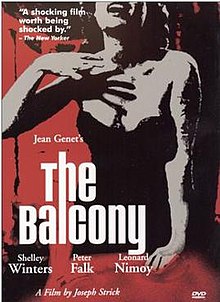The Balcony (film)
| The Balcony | |
|---|---|
 Cover art for 2000 DVD release | |
| Directed by | Joseph Strick |
| Written by | Jean Genet Ben Maddow |
| Produced by | Ben Maddow Joseph Strick |
| Starring | Shelley Winters Peter Falk Leonard Nimoy Ruby Dee Lee Grant |
| Cinematography | George J. Folsey |
| Edited by | Chester W. Schaeffer |
| Distributed by | Continental Distributing |
Release date |
|
Running time | 84 minutes |
| Country | United States |
| Language | English |
| Budget | $165,000[1] |
| Box office | $1,200,000 (US/Canada)[2] |
The Balcony is a 1963 film adaptation of Jean Genet's 1957 play The Balcony, directed by Joseph Strick. It stars Shelley Winters, Peter Falk, Lee Grant and Leonard Nimoy. George J. Folsey was nominated for an Academy Award for Best Cinematography. Ben Maddow was nominated for a Writers Guild of America Award. The film also credits the photographer Helen Levitt as an assistant director and Verna Fields as the sound editor.[3]
Plot
[edit]Shelley Winters plays the madam of a brothel where customers play out their erotic fantasies, oblivious to a revolution that is sweeping the country. When her old friend, the chief of police (Peter Falk), asks her to impersonate the missing queen in order to reassure the people and halt the revolution, she offers instead that three of her customers play the general, bishop and chief justice, all of whom have died in the revolution.[4]
Cast
[edit]- Shelley Winters - Madame Irma
- Peter Falk - Police Chief
- Lee Grant - Carmen
- Peter Brocco - Judge
- Jeff Corey - Bishop
- Ruby Dee - Thief
- Joyce Jameson - Penitent
- Arnette Jens - Horse
- Leonard Nimoy - Roger
- Kent Smith - General
Reception
[edit]Shortly after its release, the film was negatively reviewed by The New York Times' critic Bosley Crowther,[5] but favorably reviewed in Variety: "With Jean Genet's apparent approval, Joe Strick and Ben Maddow have eliminated the play's obscene language (though it's still plenty rough) and clarified some of its obscurations. The result is a tough, vivid and dispassionate fantasy."[6]
Following the release of the DVD in 2000, Karl Wareham also reviewed the film favorably: "The Balcony is recommended for those who like an enigma of a film, one that tugs at your subconscious long after the titles fade. It’s a film that reaches to the very heart of why our society works in the way it does, and presents unrelenting questions and dilemmas."[7]
Ben Madow said "it's not a very good film, though it has some interesting passages in it. And it really exploited this idea of making this whorehouse a soundstage. I didn't know it at the time, but Strick had pledged his entire worth in order to get the bank loan to make the film. He never told anybody. So he was in a panic. It showed."[8]
Preservation
[edit]The Academy Film Archive preserved The Balcony in 2010.[9]
See also
[edit]References
[edit]- ^ Caute, David (1994). Joseph Losey. Oxford University Press. p. 6.
- ^ "Top Rental Features of 1963", Variety, January 8, 1964, p 71. Please note figures are rentals as opposed to total gross.
- ^ The Balcony at IMDb
- ^ "The Balcony (1963) - Overview - TCM.com". Turner Classic Movies.
- ^ Crowther, Bosley (March 22, 1963). "'The Balcony' Emerges as Labored Mockery". The New York Times. Retrieved 2018-11-21.
- ^ Variety Staff (1963). "The Balcony". Variety. Archived from the original on January 29, 2016. Retrieved January 6, 2009.
- ^ Wareham, Karl (2004-03-17). "DVD Times - The Balcony". DVD Times. Archived from the original on April 26, 2005.
- ^ McGilligan, Pat (1991). "Ben Maddow: The Invisible Man". In McGilligan, Pat (ed.). Backstory 2: Interviews with Screenwriters of the 1940s and 1950s. University of California Press. p. 180.
- ^ "Preserved Projects". Academy Film Archive.
